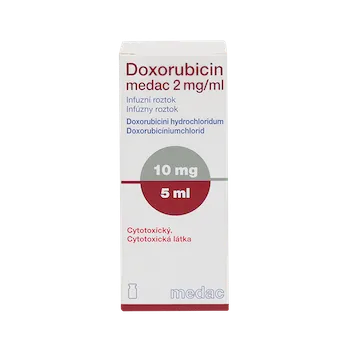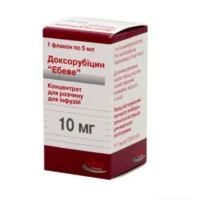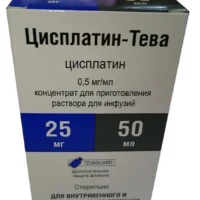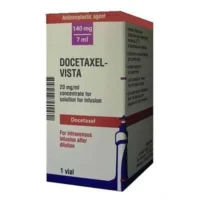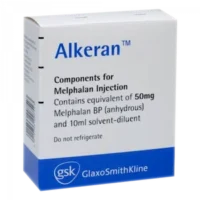Description
Doxorubicin Medak (doxorubicin) Solution for Infusions 2 mg/ml. 5 ml. (10 mg.) №1 Vial
Composition
Active Ingredient: Doxorubicin hydrochloride. Inactive ingredients may include sodium chloride, hydrochloric acid, and water for injections.
Mechanism of Action
Pharmacological Properties: Doxorubicin exerts its antitumor effects by inhibiting the topoisomerase II enzyme, leading to DNA damage and cell death. Additionally, it generates free radicals causing oxidative stress, further contributing to its cytotoxic effects.
Indications for Use
Indications: Doxorubicin Medak is indicated for the treatment of various types of cancers including breast cancer, lung cancer, and leukemia. It works by slowing or stopping the growth of cancer cells.
Contraindications
Contraindications: Doxorubicin Medak is contraindicated in patients with severe myelosuppression, severe hepatic impairment, and hypersensitivity to doxorubicin or any of the inactive ingredients.
Side Effects
Patients receiving Doxorubicin Medak should be monitored for signs of cardiotoxicity, myelosuppression, and other potential adverse effects. Common side effects may include nausea, vomiting, hair loss, and increased risk of infections.
Usage Instructions
Dosage: The dosage of Doxorubicin Medak is individualized based on factors such as body surface area and the specific condition being treated. It is administered intravenously by healthcare professionals experienced in cytotoxic chemotherapy agents.
Benefits Compared to Analogues
Doxorubicin is considered a cornerstone in cancer treatment and is often used in combination with other chemotherapy agents to enhance its effectiveness. Its efficacy in both early-stage and advanced cancers makes it a vital component in cancer therapy regimens.
Suitable Patient Groups
Doxorubicin Medak can be used in various patient populations including adults, elderly patients, and pediatric patients under appropriate medical supervision. Dosage adjustments may be necessary based on individual patient characteristics.
Storage and Packaging
Doxorubicin Medak should be stored according to the manufacturer’s instructions, typically at controlled room temperature. The shelf life of the product should be checked before use. Each vial is for single-use only and should be discarded properly after administration.
Clinical Evidence and Proven Effectiveness
Doxorubicin, the active ingredient in Doxorubicin Medak, has been extensively studied for its efficacy in treating various cancers. Research studies have shown that doxorubicin works by intercalating into DNA strands, inhibiting nucleic acid synthesis and ultimately leading to cell death in cancer cells. Clinical trials have demonstrated the effectiveness of doxorubicin in improving survival rates and reducing tumor size in patients with different types of cancer.

